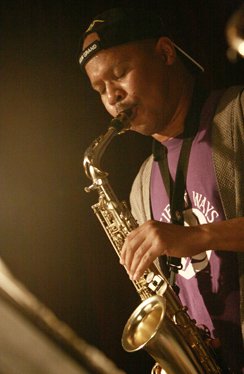Steve Coleman on being a "MacArthur Genius"
This past Wednesday, the MacArthur Foundation announced its annual MacArthur Fellows -- those so-called "Genius Awards" -- to 21 exceptionally talented people from all fields of human endeavor. So what's it like to be a winner? Here is a first person account of a "genius" at play:
Do I feel like a genius? No!
My name is Steve Coleman, and I'm a saxophonist, composer, bandleader.
I grew up in Chicago. I started playing violin first, around the age of 14. About a year-and-a-half after that, I started playing saxophone.
My father played a lot of records at home. I mean, he was playing Charlie Parker, Ray Charles, Billie Holiday. I just referred to it as "old people's music" when I was younger.
But as I got older, and I started learning how to play, I would go to a club and I found that, Wow, I know this song. I've heard it somewhere before. And I would play it, and it would just come out.
After I got out of college, I hitch-hiked to New York. The main reason I went there was because of all of the creative music that was coming out of New York, and I knew that that was the place to be.
I stayed at the YMCA. I mostly played on the street for a living, right at 50th and Broadway.
I joined the Thad Jones-Mel Lewis Orchestra. Our first tour was, like, 10 weeks in Europe. It was amazing, considering that I was playing in the streets just a few months before that.
As I was learning this music, I would listen to certain things that would have a transformative effect on me. Certain types of music would just open me up. And I thought from that point, that's what I wanted to do. I wanted to play music that had that kind of effect on people, that in some kind of way transformed them, that opened them up.
This is my opportunity to do that.
I've studied a lot of different philosophies, ancient civilizations. I didn't just want to study the history of the music that I was playing; I wanted to study the history of all music.
When I start composing, the first thing that happens is that there's a story, or some kind of image -- a symbolism inside my head -- and I'm trying to capture that in sound.
When I'm improvising, it's just like talking to somebody. It's like having a conversation with audience members, with the band members.
I often think about the pulse of the human heart, how it connects to the brain, and how that relates to rhythm. I've noticed that there's a lot of the things that we do comes from this internal kind of rhythm.
Not everyone will get our music, but upon repeated listening, I guarantee you there's something there.
When I got a call from the MacArthur Foundation, I was like, "OK, who is this?" I thought it was a joke.
This grant is for $625,000; I was like, woah!
One of the things I'm going to do is to bring my music to a lot of different communities.
When I was very young, a great saxophonist named Sonny Stitt told me: "If you take care of that horn, that horn will take care of you." I didn't believe him then, but I believe him now.
To listen to Steve Coleman and Five Elements perform "Adrenal Got Ghost," from the album "Functional Arrhythmias," click on the player below.
For more info:
- m-base.com (Steve Coleman's official site)
- Follow Steve Coleman on Twitter (@mbase), Facebook and YouTube
- Steve Coleman recordings on Amazon and iTunes
- 2014 MacArthur Fellows (macfound.org)
